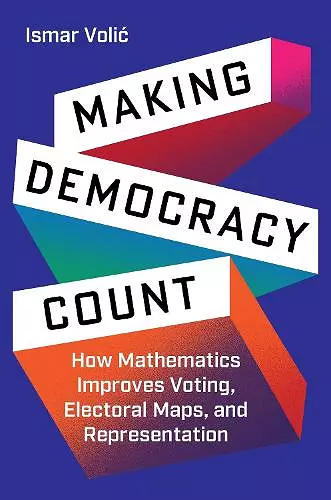Making Democracy Count
How Mathematics Improves Voting, Electoral Maps, and Representation
Format:Hardback
Publisher:Princeton University Press
Published:28th May '24
Should be back in stock very soon
This hardback is available in another edition too:
- Paperback£17.99(9780691248813)

How we can repair our democracy by rebuilding the mechanisms that power it
What’s the best way to determine what most voters want when multiple candidates are running? What’s the fairest way to allocate legislative seats to different constituencies? What’s the least distorted way to draw voting districts? Not the way we do things now. Democracy is mathematical to its very foundations. Yet most of the methods in use are a historical grab bag of the shortsighted, the cynical, the innumerate, and the outright discriminatory. Making Democracy Count sheds new light on our electoral systems, revealing how a deeper understanding of their mathematics is the key to creating civic infrastructure that works for everyone.
In this timely guide, Ismar Volić empowers us to use mathematical thinking as an objective, nonpartisan framework that rises above the noise and rancor of today’s divided public square. Examining our representative democracy using powerful clarifying concepts, Volić shows why our current voting system stifles political diversity, why the size of the House of Representatives contributes to its paralysis, why gerrymandering is a sinister instrument that entrenches partisanship and disenfranchisement, why the Electoral College must be rethought, and what can work better and why. Volić also discusses the legal and constitutional practicalities involved and proposes a road map for repairing the mathematical structures that undergird representative government.
Making Democracy Count gives us the concrete knowledge and the confidence to advocate for a more just, equitable, and inclusive democracy.
"Finalist for the PROSE Award in Popular Science and Mathematics, Association of American Publishers"
"Winner of the Euler Prize, Mathematical Association of America"
"Volić often effectively follows up clear illustrations using small sets of data with real-world examples. . . . Overall, this fascinating book is thought provoking and strongly recommended."---N. W. Schillow, Choice
"The book reads nothing like a math textbook. It stays approachable, even while diving deep into its subject matter. . . . There’s no one better to teach this material than Ismar Volić."---Deb Otis, National Civic League
"As the United States grapples with persistent challenges in its electoral system, Volić’s work is a timely contribution, offering a rigorous analysis of how mathematical principles can enhance the fairness and integrity of democratic processes."---Hank Lacey, Law of the West
"Volić surveys voting and apportionment methods, including impossibility results, in a readable way with real-life examples." * Mathematics Magazine *
"Provides insight into mathematical thinking and creativity, and analytical tools for critically assessing policy. . . . Engaged readers will find inspiration to apply these insights in their own exploration."---Jan Cameron, The Mathematical Intelligencer
"[Offers] thought-provoking discussions of very relevant points about the structure of our government . . . and the problematic ways our votes count (or don't). While there may be no perfect system, we can use math to do better in our democracy; learn how in this incredibly up-to-date book."---Emily J. Olson, Notices of the American Mathematical Society
"[Offers] thought-provoking discussions of very relevant points about the structure of our government."---Emily J. Olson, Notices of the AMS
"Mathematicians have developed fairness axioms, voting systems, ensemble analysis, and many more tools to help us understand democracy and representation and make better choices. Voli'c's book opens the door to these topics for a general audience and makes the case that to understand democracy, we need math, and luckily that math is accessible to everyone."---Anita T. Layton, SIAM Review
ISBN: 9780691248806
Dimensions: unknown
Weight: unknown
408 pages